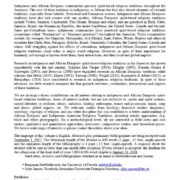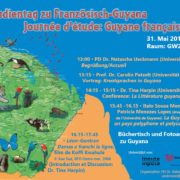Call for Papers „Rethinking Europe from the Caribbean: Entanglements and Legacies“ 12-15 April, 2018 Albert-Ludwigs-University of Freiburg, Germany
Call for Papers
„Rethinking Europe from the Caribbean: Entanglements and Legacies“
12-15 April, 2018
Albert-Ludwigs-University of Freiburg, Germany
The multiple ties that bind the Caribbean and Europe are the main focus of the conference marking 30 years since the Society for Caribbean Research (Socare) was founded. The Caribbean was the first region to be colonized by European powers in the 16th century and the last one to be (incompletely) decolonized in the 20th century. It received more than one-third of all Africans trafficked in the European trade in enslaved people between the 16th and 19th centuries as well as significant numbers of indentured and contracted European laborers during much of the same period, followed by indentureship and contract labor from Asia. The region was devastated by the genocide of indigenous populations at the hands of European colonists and experienced some of the most intense economic exploitation among Europe’s colonies. After World War II, European states compensated for their domestic labor shortages by recruiting large numbers of workers from their Caribbean colonies. This also prompted changes in the citizenship policies that European colonial powers directed at these migrants.
Today, more than one-third of Europe’s remaining colonial possessions are located in the Caribbean, and the CARICOM Reparations Commission, established in 2013, states that it “finds European colonial rule as a persistent part of Caribbean life.”[1] Nevertheless, historiography, geography, as well as social, literary, and cultural theories tend to conceive of Europe and the Caribbean as separate, even antithetical regions. For social sciences focused on modern industrial societies, the Caribbean’s legacy of enslavement made it appear as paradigmatically backward, inefficient, and underdeveloped. As such, it constituted the opposite of the notion of the free, modern, and efficient wage-work which Europe claimed to have pioneered. Having been shaped by an influx of African, European and Asian populations, the Caribbean has come to represent racial and ethnic diversity par excellence, as also evidenced in Caribbean thinkers’ theorizations of transculturation, hybridity, and creolization. In contrast, Europe – following centuries of mass emigration, nation-building processes, expulsions, and waves of ethnic cleansing – stood for high levels of ethnic homogenization. The reversal of the migration pattern since the mid-20th century in the direction of Europe, among other regions, triggered large-scale debates on race on the continent and increasingly framed immigration as a threat to European societies. In the context of literary studies, the canonical status of European ‘national’ literatures still tends to be juxtaposed to ‘postcolonial’ Caribbean literary production. Notions of postcoloniality similarly focus mainly on the former colonies, while only recently debates across Europe have begun to address the question of Europe’s postcoloniality.
In the wake of the humanitarian crises following the most recent hurricanes and earthquakes in the Greater Caribbean, limited and discrepant disaster relief efforts have again raised questions about political and economic relations between Western powers and the Caribbean. Facing public health disasters and waves of out-migration, island economies are further challenged through current citizenship regimes, fragmented political accountability and exploitative economic arrangements, which highlight the ambivalent geopolitical status of many Caribbean territories vis-à-vis European and U.S.-American interests.
Against the backdrop of these and related aspects, the conference focuses on the legacies and continuities of European colonialism in the region and on transregional entanglements between the Caribbean and Europe. Examining languages, (post)colonial histories, socioeconomic trajectories, and aesthetic practices in the Caribbean in their relations to Europe also provides a basis for rethinking Europe from the Caribbean. The conference aims to challenge the hypervisibility of Western Europe by highlighting Caribbean entanglements with othered and racialized Southern and Eastern Europes, as well as through the frequently ‘forgotten Europes’ still claimed as overseas territories and regions in the Greater Caribbean. What can Caribbean perspectives contribute to a different and more nuanced understanding of Europe(s) today?
We invite contributions from different research fields including, but not limited to, literary and cultural studies, sociology, anthropology, linguistics, philosophy, history, geography, and political science. Inter- and transdisciplinary perspectives are particularly welcome, as are poster presentations of PhD projects. We welcome contributions in English, French or Spanish and encourage handouts or presentation material in one of the languages other than that of the oral presentation. Possible topics include:
- The Caribbean as a laboratory of European modernity
- The political economy of race and racialization of the Caribbean in Europe
- Migration flows linking Europe and the Caribbean
- Coloniality, incomplete decolonization, and European Caribbean territories today
- Capitalism and non-wage labor in Europe and the Caribbean: enslavement, second serfdom, indentureship, apprenticeship
- European economic interests in today’s Caribbean: e.g., resort tourism, tax havens, land ownership and free-trade zones
- European and Commonwealth citizenships in the Caribbean as well as Caribbean citizenships in Europe
- Climate change, humanitarian crises, and disaster relief in the context of geopolitical ambivalence and fragmented sovereignties in the Caribbean
- The Caribbean in European politics of memory: e.g., native genocide, enslavement, CARICOM’s call for reparations from European countries
- Rethinking Europe(s) through Caribbean notions of transculturation, hybridity, and creolization
- Aesthetic entanglements between the Caribbean and Eastern or Southern Europe in literature, film, or visual arts
- Linguistic practices, interrelations, and language policies
Proposals for papers or posters (please state your choice) should include the author’s name and affiliation, presentation title, an abstract of around 300 words, as well as a short paragraph with biographical information.
Please submit proposals via e-mail to both conveners by 15 November 2017
Manuela Boatcă: manuela.boatca@soziologie.uni-freiburg.de
Annika McPherson: annika.mcpherson@philhist.uni-augsburg.de
[1] http://caricomreparations.org/caricom/caricoms-10-point-reparation-plan/




